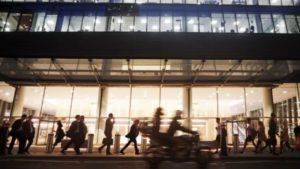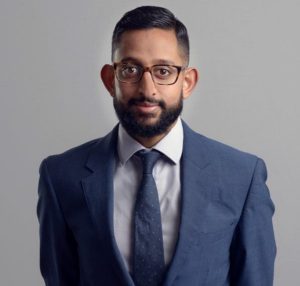BBCでは、英国でのロックダウン後のオフィス事情を伝えています。1つは最新のデバイスを使って、陽性者の追跡情報を提供するやりかた。他方はそれに対する批判的な意見。いずれも、英国の状況を知ることができる非常に興味深いものです。
Introduction
The coronavirus outbreak is changing the workplace. As employees slowly return to work after lockdown, tech companies are busy finding ways for them return safely.
 はじめに
はじめに
コロナウイルスの流行は、職場を変えようとしています。従業員がロックダウン後に少しずつ職場に戻るにつれて、ハイテク企業は安全に復帰する方法を模索するのに余念がありません。
For many, the return to the office has begun. And to make things safe, new thermal cameras are being installed in some workplaces. They measure body temperature to screen for coronavirus.
多くの人が今やオフィスに戻ろうとしています。安全を確保するために、新しい赤外線カメラが設置されるようになった職場もあります。これによって体温を測定してコロナウイルスの検査をするのです。
After weeks of working at home the return to the office is slowly getting underway in a number of countries.
数週間の自宅でのリモートワークを経て、オフィスへの復帰が多くの国で徐々に進んでいます。
But workplaces are having to change in this coronavirus era. Lots of companies are rushing to install technology to make offices and workplaces safer. Sensors that monitor our movements, smartphone apps that alert us if we get too close to workmates and even devices that take our temperature could all become the new normal – that’s a phrase we hear a lot these days, meaning a previously unfamiliar situation that has become usual and expected.
しかし、このコロナウイルス時代では、職場は変化を余儀なくされています。多くの企業が、オフィスや職場をより安全にするためのテクノロジーの導入を急いでいます。人々の動きを監視するセンサーや、職場の仲間に近づきすぎると警告するスマートフォンのアプリ、さらには体温を測る装置などの導入など、これがすべて「ニューノーマル」になる可能性があります。このフレーズは、最近よく耳にしますが、以前は慣れ親しんでいなかった状況がむしろ当たり前になり、予想されていたという意味が込められています。
Now, as employees slowly return to work, tech companies are busy finding ways for them to do so safely. One such company, ‘Microshare’, is managed by Charles Paumelle. He spoke to BBC World Service programme Tech Tent to explain a possible solution.
従業員が今は徐々に仕事に復帰するようになるにつれ、ハイテク企業は安全に復帰する方法を模索するのに余念がありません。そのような企業の一つがマイクロシェアで、チャールズ・パウメル氏が経営の指揮を執っています。氏がBBCワールドサービスの番組、Tech Tent で、採用が可能な解決策について説明しました。
********************************************************
Charles Paumelle
The technology that we are offering is using Bluetooth wristbands or tags that people are wearing within the workplace which detect proximity events. When the proximity event has been recorded, it’s been saved by the company in case they need to, further down the line, retrace the steps of a certain person who has been declared as infected and inform anyone else they may have been in contact with.
当社が提供するテクノロジーは、人々が職場内で身につけるブルートゥースのリストバンドやタグを使って、近接した場所で起こった出来事を検出するものです。近接イベントが記録されると、会社がそれを保存しているので、もし後で必要になったなら、感染していると宣言されている特定の人がたどったステップを追跡し、接触しているかも知れない人に通知できるのです。
******************************************************
One important way to control coronavirus involves contact tracing. This means that someone who tests positive for the disease informs everyone else they’ve been in contact with. Microshare’s system for this uses Bluetooth – technology that allows computers, mobile phones and other devices to communicate with each other without being connected by wires.
コロナウイルスをコントロールできる重要な方法の一つに、接触者追跡があります。要するに、コロナウイルスに陽性と判定された人が、接触している他のすべての人に知らせるために使われます。マイクロシェアのシステムでは、ブルートゥースを使います。これは、コンピュータ、携帯電話、その他のデバイスを無線を使ってお互いに通信できるようにするテクノロジーです。
Wearing wristbands, monitoring data on smartphones and being recorded by cameras – it all feels like quite a big invasion of privacy, doesn’t it?
リストバンドをつけたり、スマートフォンのデータを監視したり、カメラに記録されたり…すべてが、かなり大きなプライバシーの侵害のように感じませんか。
It certainly does, and although some argue that such measures are necessary in these unprecedented times, others are worried about the possible consequences. Here’s human rights lawyer, Ravi Naik, with a warning:
確かにそうなのです。前例のない現代には このような措置が必要だと主張する人もいる一方で、当然起こりうる結果について心配している人たちがいます。ここでは人権派弁護士のラヴィ・ナイク氏が警告を発しています。
********************************************************
 Ravi Naik
Ravi Naik
From a human rights perspective, you have to try to ask, are you trying to use tech for tech’s sake – is this actually going to facilitate an understanding of who is safe to go back to work or not? And if not, what’s the necessity of this because it’s such a significant interference with basic human rights. There has to be a high level of evidential justification to deploy this type of technology and I just don’t think it’s there.
人権の観点からは、技術のために技術を使おうとしているのか、実際に誰が安全に仕事に復帰できるかどうかの理解を促進するために技術を使おうとしているのか、よく問いたださなければなりません。もし、そうでない場合はどうする必要があるのかをよく考える必要があります。なぜなら、その場合基本的人権を著しく侵害することになるからです。この種の技術を導入するには高いレベルの正当性が証拠とともに必要ですが、私にはそれがあるとは思えません。
********************************************************
Ravi questions whether these devices will actually help identify who can return to work, or whether the technology is being used for its own sake – an expression meaning doing something because it is interesting and enjoyable, not because you need to.
ラヴィ氏は、これらのデバイスが実際に仕事に復帰できる人を特定するのに役立つのか、それとも、この技術がそれ自体のために使われているのかとの疑問を呈しています。
Ravi’s work as a lawyer involves finding proof that something is right or wrong. If people’s human rights are being interfered with, he thinks there has to be evidential justification – explanation of the reasons why something is the right thing to do, based on evidence. Like the evidence from screening body temperature…
弁護士として彼の仕事は、何かをするときにそれが正しいか間違っているかの証拠を見つけることです。人々の人権が干渉されている場合、証拠に基づいて、何かを行うには正しいことである理由の説明、つまり証拠を伴ってそれが正当化されなければならないと考えています。体温検査の証拠のように…。



最近のコメント